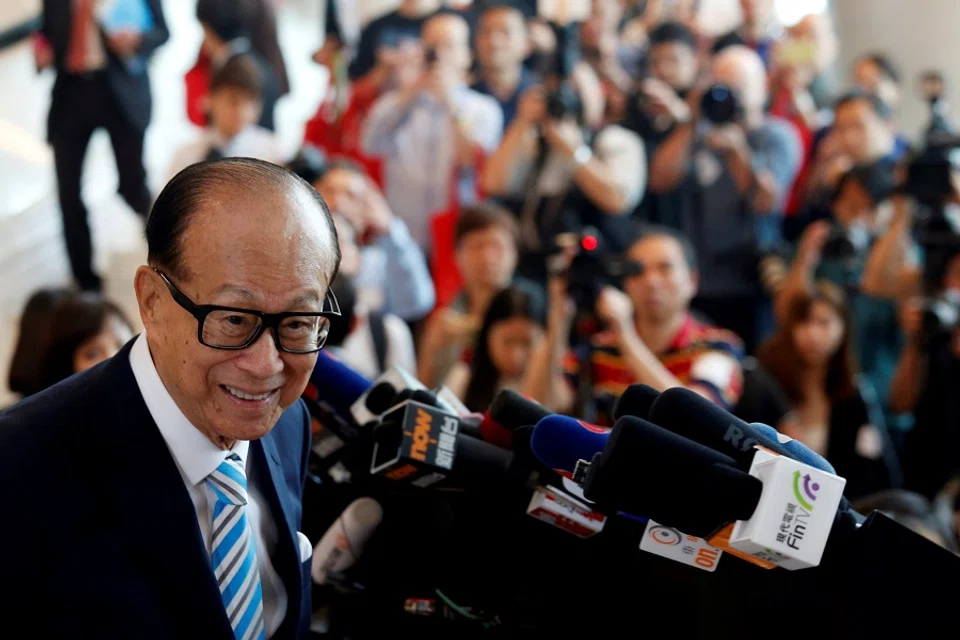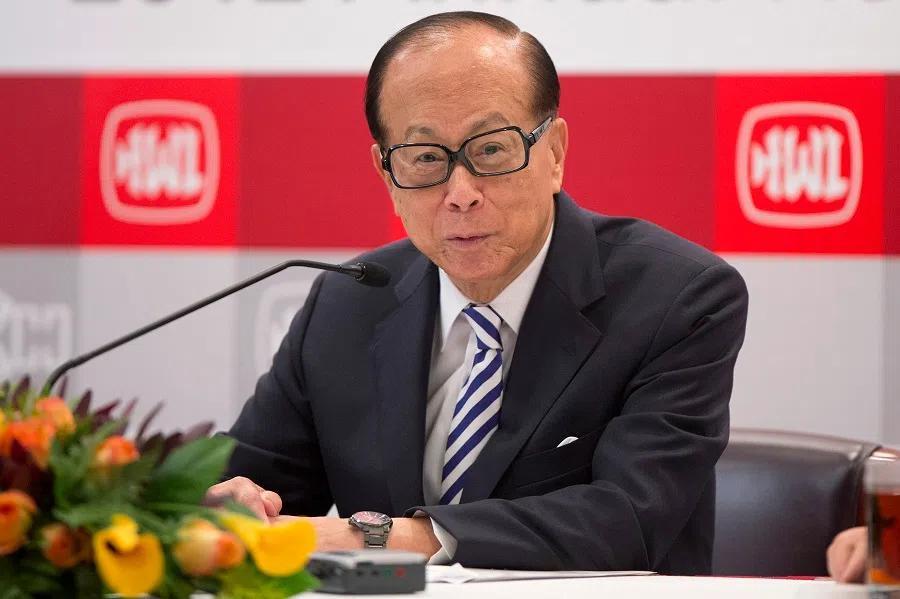Li Ka-shing’s port sale: Business deal or betrayal?
Hong Kong billionaire magnate Li Ka-shing was accused of selling out Chinese interests to the US after his company CK Hutchison sold 43 ports to US investment firm BlackRock. But what choice did Li really have? Not much, says Lianhe Zaobao correspondent Yu Zeyuan, who tells us more about the complexity of the situation.

Li Ka-shing, Hong Kong’s wealthiest man, has again found himself embroiled in a political maelstrom after announcing that his company, CK Hutchison, will sell 43 ports — including two along the Panama Canal — to US investment company BlackRock. Chinese public opinion thinks that Li’s decision to sell sensitive port assets to a US firm is not a simple business transaction, and is concerned that BlackRock could potentially use this deal to support US government efforts to suppress China’s trade.
CK Hutchison announced on 4 March that it would sell its stakes in 43 ports across 23 countries to a US consortium led by BlackRock for US$22.8 billion. The company’s co-managing director Frank Sixt emphasised that the transaction was purely commercial in nature and not politically motivated.
As the transaction coincided with China’s Two Sessions, mainstream Chinese media did not pay much attention then.
... the US could use this transaction as a “template” to control more critical ports around the world and even implement suppressive measures through “long-arm jurisdiction”, leaving Chinese ships with “nowhere to dock”. — Hong Kong Ta Kung Pao
CK Hutchison’s sale of ports prompts backlash
After the Two Sessions concluded, pro-Beijing Hong Kong media Ta Kung Pao published a commentary titled “Do Not be Naive and Do Not be Fooled” (莫天真 勿糊涂) on 13 March, asserting that the transaction between CK Hutchison and BlackRock is an act of hegemony by the US. The article described the transaction as an example of the US attempting to use its state power to encroach on other countries’ legitimate rights and interests, through despicable means such as coercion and pressure. The transaction, according to the commentary, is essentially power politics disguised as “business behaviour”.
The opinion piece argued that the US could use this transaction as a “template” to control more critical ports around the world and even implement suppressive measures through “long-arm jurisdiction”, leaving Chinese ships with “nowhere to dock”. In the face of such a critical event, the commentary also urged companies involved to carefully consider the nature and critical aspects of the issue and to think about the side they want to take.

China’s Hong Kong and Macau Affairs Office reposted this strongly worded commentary, suggesting that it represents the official position.
On 15 March, Ta Kung Pao published another article questioning why CK Hutchison would so readily transfer so many important ports to potentially hostile US interests, and what kind of political calculations were hidden beneath the facade of a business transaction. The article also asked whether the so-called “shrewd” transaction considered national and ethnic interests, and if the choice amounted to aiding and abetting the evildoer and ultimately harming both China and the world. It called on relevant entrepreneurs to weigh their options carefully at such a critical moral juncture, and to consider the direction they should lead the enterprise towards.
The commentary condemned the transaction, asserting that while colluding with American politicians and going against the tide might bring short-term profits, “ultimately they will have no future and will bear a historical stigma”.
... his current sale of ports to a US consortium appears to be an effort to avoid becoming a casualty in China-US rivalry.
Official stance now less tolerant towards Li
This is not the first time that Li has come under fire for being “unpatriotic”. Around 2015, Li faced public criticism for divesting heavily from Chinese assets. Many accused him of being an “unscrupulous businessman” who made a great deal of money in China but lacked faith in the future of the Chinese market. “Don’t Let Li Ka-shing Run Away” (别让李嘉诚跑了) even became a trending topic at the time.

However, during that time, China’s mainstream media maintained a relatively rational and even tolerant stance towards Li’s divestment. In September 2015, the People’s Daily published an article stating that it is in the nature of capital to seek profit, and that market rules require adherence to the rule of law. As long as it operates within the legal framework, capital has the right to move about freely. The article suggested that it was both difficult and unnecessary to retain someone set on leaving, expressing confidence that an open and inclusive China would create a better business environment for entrepreneurs.
The Jiefang Daily also published an article then that suggested that instead of trying to retain Li, it was better to bid him farewell, adding that “we should neither degrade ourselves by begging him to stay nor resort to emotional verbal abuse. Instead, we should build this country better so that today’s departure becomes tomorrow’s regret”.
Some netizens claimed that if the deal went through, the Li family would “profit greatly” while the Trump administration would have achieved its intended goals, with China taking a huge loss.
China-US rivalry creates a hostile business environment
If Li’s divestment a decade ago was due to a lack of confidence in the prospects of China’s economy and real estate market then, his current sale of ports to a US consortium appears to be an effort to avoid becoming a casualty in China-US rivalry.
Compared to the past few years, when globalisation was in full swing and conglomerates faced fewer global expansion restrictions, the recent full-scale China-US competition has forced large conglomerates like CK Hutchison to consider the risks posed by the broader environment. This is especially so after Donald Trump’s return to the White House. Trump repeatedly accused China of effectively controlling the Panama Canal, and declared that the US should regain control over it. His assertion likely included CK Hutchison’s operational rights over the two ports in the Panama Canal.
On 1 February, US Secretary of State Marco Rubio made his first official visit after taking office to Panama. Rubio informed the Panamanian government that if Panama did not withdraw from the Belt and Road Initiative (BRI), the US would no longer maintain the current status of the Panama Canal; in other words, the US could reclaim control of the canal.

Shortly after Rubio’s visit, the Panamanian authorities announced its decision not to renew its BRI agreement with China. CK Hutchison, which operates two ports in the Panama Canal, naturally felt pressure from the US.
That Li was once again lambasted also highlights the difficulty businesses face in navigating the larger context of China-US competition, where at times it is challenging for entrepreneurs to appease both sides.
Desperation or business?
Against this backdrop, CK Hutchison discreetly and swiftly reached an agreement with BlackRock to sell the ports, thereby recovering a significant amount of funds. This was seen as an urgent, desperate measure adopted to mitigate risks. After all, in the face of the aggressive Trump administration, CK Hutchison was neither capable nor willing to butt heads with them. Moreover, other than selling the ports to a US-led consortium, it is unlikely that capital from other countries would want to get entangled in such contentious affairs.
Whether due to necessity or business acumen, Li’s sale of sensitive ports to American capital inevitably drew criticism from Chinese public opinion. Some netizens claimed that if the deal went through, the Li family would “profit greatly” while the Trump administration would have achieved its intended goals, with China taking a huge loss.
The reposting of Ta Kung Pao’s critical article on Li on Hong Kong and Macau Affairs Office’s website indicates that the Chinese government was dissatisfied with his actions. It also suggests that there may still be uncertainties regarding the port deal between CK Hutchison and BlackRock. After all, the Li family still has substantial business interests within China — if mishandled, the profits from the port deal might not compensate for losses in other areas.
That Li was once again lambasted also highlights the difficulty businesses face in navigating the larger context of China-US competition, where at times it is challenging for entrepreneurs to appease both sides. Learning to survive in an environment with little tolerance is a challenge that business magnates like Li cannot avoid.
This article was first published in Lianhe Zaobao as “李嘉诚又陷政治漩涡”.





